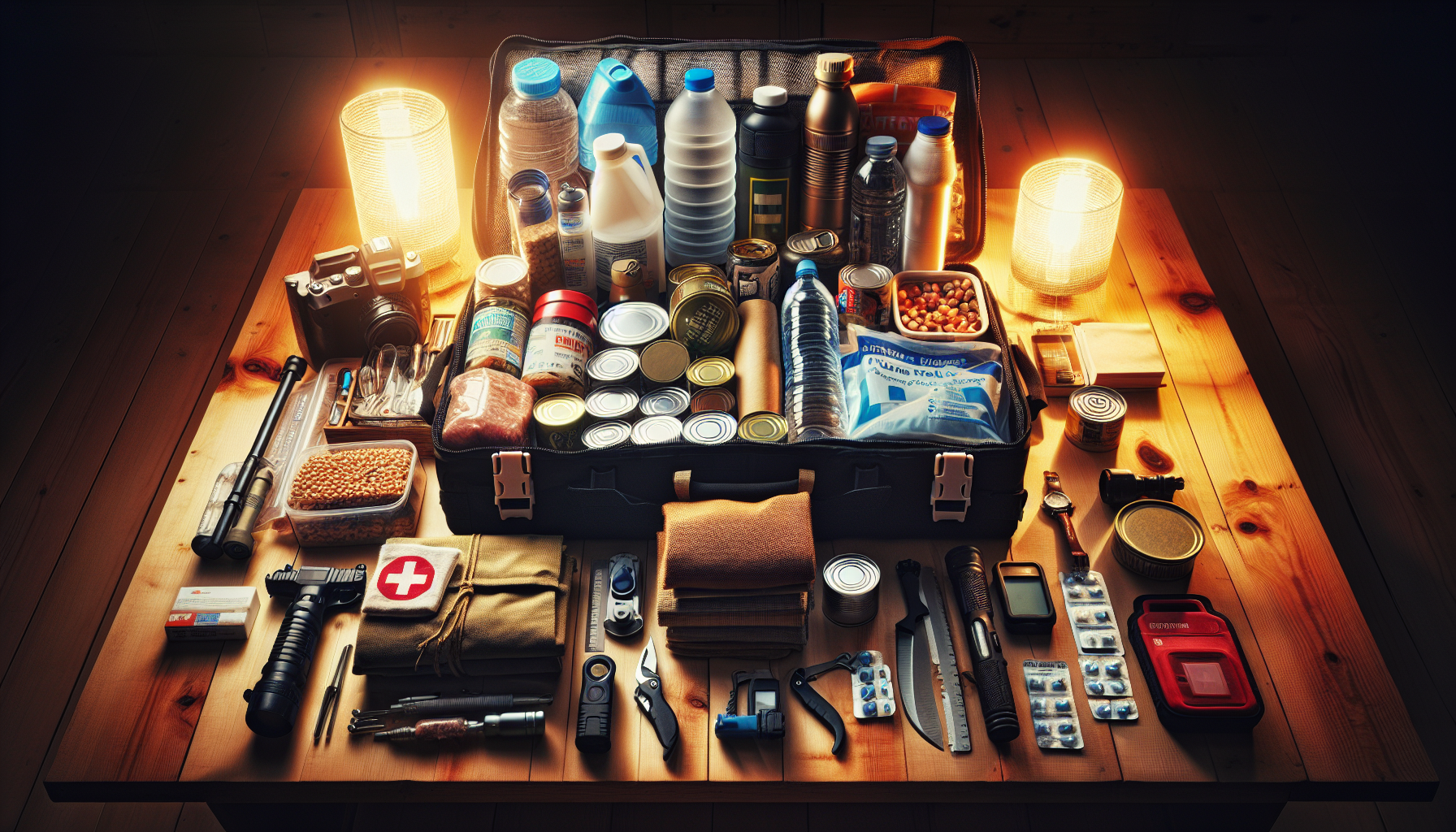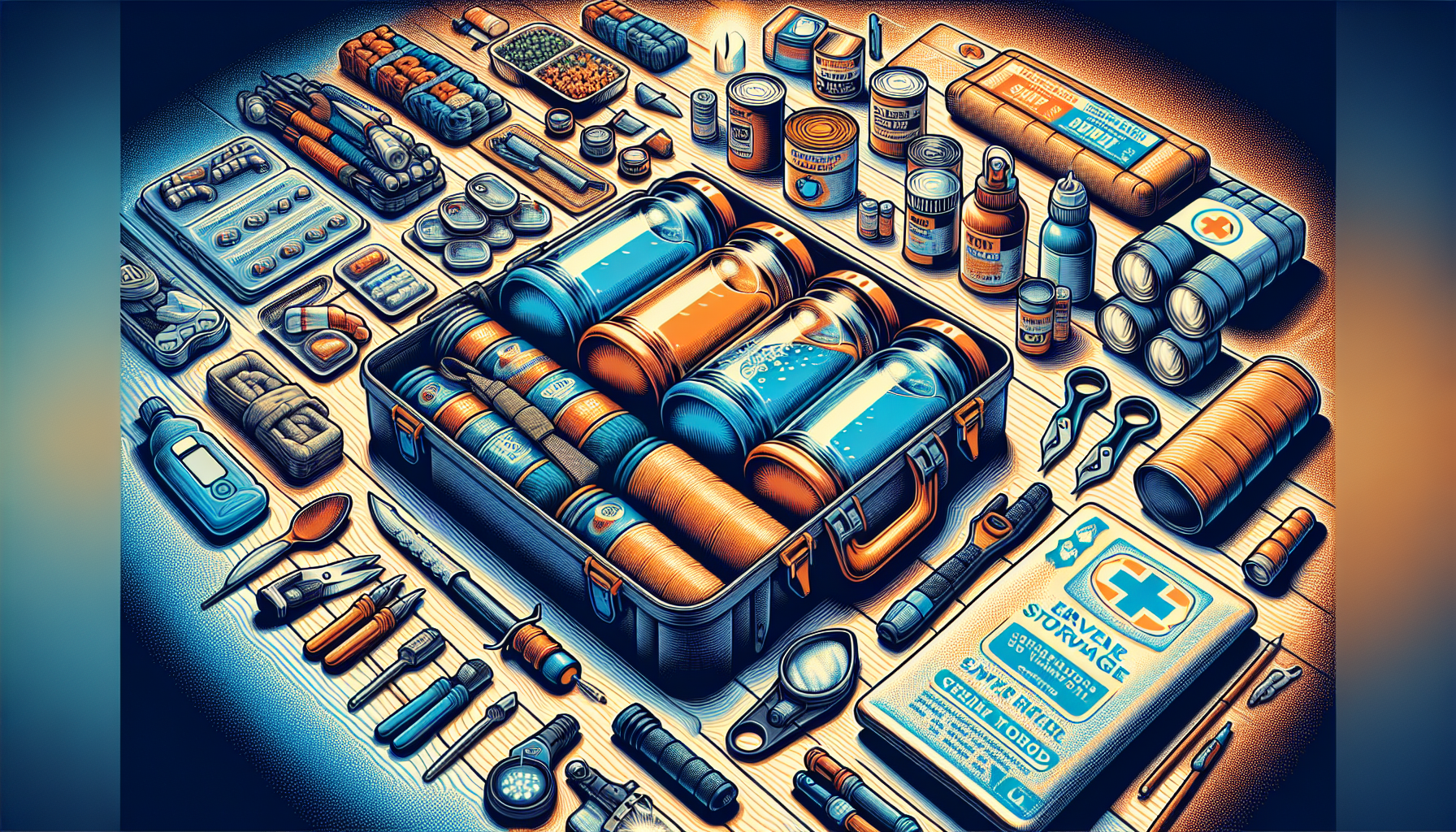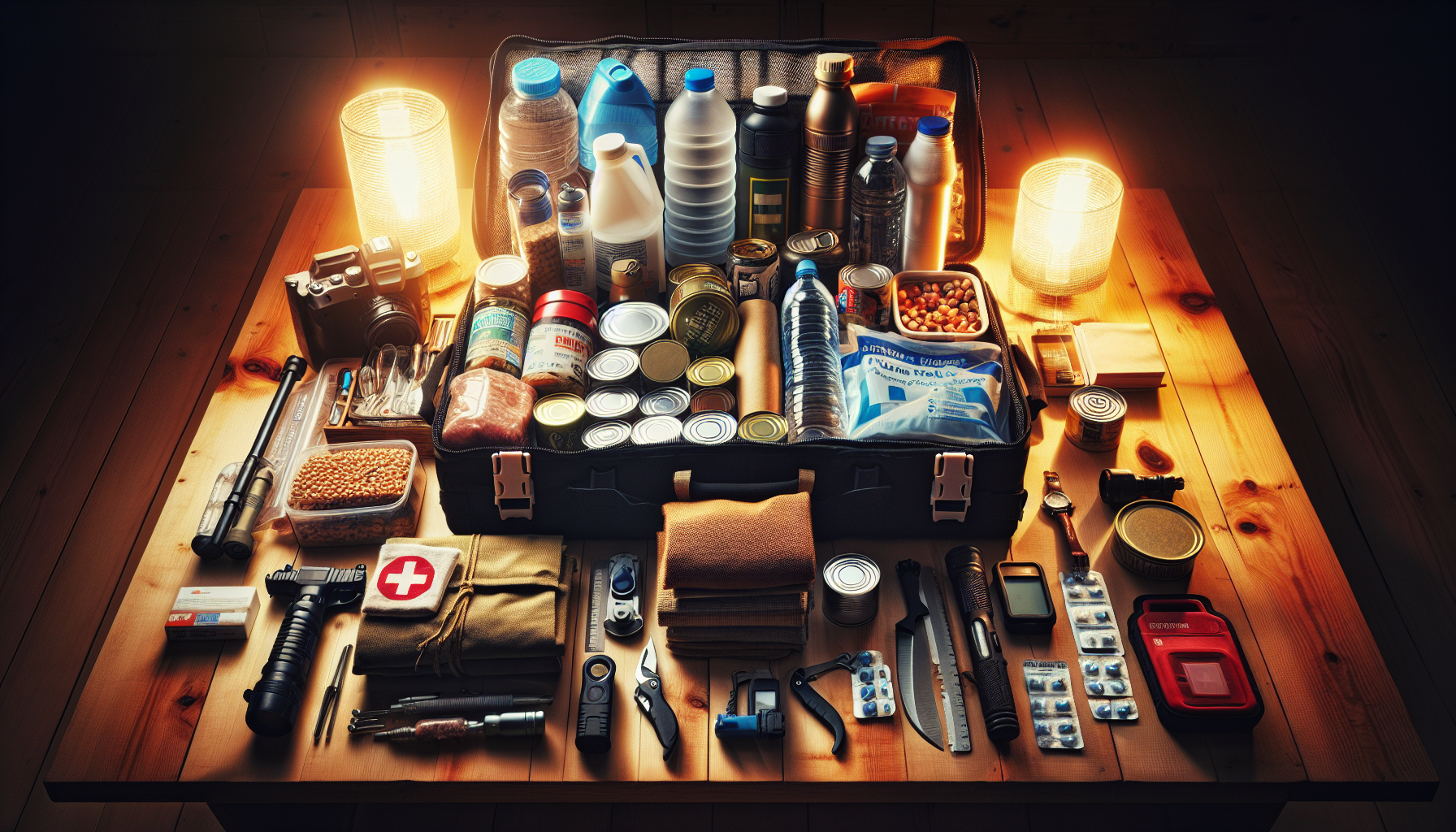So you’ve decided to explore the world of prepping and are wondering what exactly you need to become a prepper. Well, look no further! In this article, we will cover the essential items and skills you should acquire to be prepared for any emergency situation. From food and water storage to first aid kits and self-defense training, we’ll provide you with a comprehensive guide to help you become a seasoned prepper.

Emergency Preparedness Plan
Define your goals and objectives
Before starting your journey as a prepper, it is important to define your goals and objectives. Consider what you want to achieve with your emergency preparedness plan. Are you aiming to protect your family in case of natural disasters, economic downturns, or social unrest? It could also involve being self-sufficient or having the ability to survive in the wilderness. Defining your goals will help guide your preparations and ensure you are focused on what is most important to you.
Assess potential risks and hazards
To effectively prepare for emergencies, you need to identify and assess potential risks and hazards that you may face in your region. Research the natural disasters that are common in your area, such as hurricanes, earthquakes, floods, or wildfires. Additionally, consider man-made risks such as power outages, civil unrest, or economic crises. By understanding the possible risks, you can tailor your emergency preparedness plan to address those specific scenarios.
Create an emergency communication plan
In times of crisis, communication becomes vital. Creating an emergency communication plan ensures that you and your loved ones can stay connected and informed. Include a list of emergency contacts, such as family members, neighbors, or friends, and establish a designated meeting point in case you get separated. It is also important to have backup communication devices, such as walkie-talkies or a battery-powered radio, in case traditional methods like cell phones are not available.
Build a stockpile of essential supplies
Having a well-stocked supply of essential items can make a significant difference during emergencies. Start by calculating your needs based on the number of people in your household and the duration you want to be prepared for. Choose long-lasting and non-perishable food items, such as canned goods, dried fruits, and nuts, and store them in a cool and dry place. Additionally, ensure you have an ample supply of water for drinking, cooking, and sanitation purposes. Consider alternative methods, such as water purification tablets or a water filter, to ensure a clean water supply.
Food and Water
Calculate your needs
To determine how much food and water you need to stockpile, consider the number of people in your household and the duration you want to be prepared for. Aim for at least a two-week supply of food and water per person as a starting point. Take into account any special dietary needs or allergies when selecting food items.
Choose long-lasting and non-perishable food items
When selecting food items for your emergency stockpile, prioritize long-lasting and non-perishable options. Canned goods, dried fruits, nuts, and protein bars are excellent choices. Opt for food items with a long shelf life and rotate them regularly to ensure freshness.
Store water for emergencies
Water is essential for survival, so storing an adequate supply is crucial. Aim for at least one gallon of water per person per day for drinking and sanitation purposes. Store water in food-grade containers in a cool, dark place to ensure its freshness. Consider investing in water purification tablets or a water filter as an alternative method for obtaining clean drinking water if your supply runs out.
Learn alternative methods for water purification
In case your water supply is compromised during an emergency, it is important to learn alternative methods for water purification. Boiling water is the most effective method to kill most types of bacteria and parasites. Additionally, investing in water purification tablets or a portable water filter can provide a reliable means of obtaining clean drinking water from natural sources like rivers or lakes.
Home Security
Evaluate your home’s vulnerabilities
Assessing the vulnerabilities of your home is a crucial step in ensuring your safety during emergencies. Walk around your property and identify any weak points, such as broken windows, poorly secured doors, or outdated locks. Look for potential hiding spots or areas that could be easily breached by intruders. By identifying these vulnerabilities, you can take proactive measures to strengthen your home’s security.
Install sturdy locks and security systems
Investing in sturdy locks and security systems can significantly enhance your home’s security. Install deadbolt locks on all exterior doors and consider reinforcing them with strike plates or door jammers. Consider installing a security system with surveillance cameras and motion sensors to deter potential intruders and provide early detection of any suspicious activity.
Secure windows and doors
Windows and doors are common entry points for intruders. Ensure your windows have secure locks and consider reinforcing them with security film or bars. Install window sensors as part of your security system to detect any attempted break-ins. For sliding glass doors, place a rod or dowel in the track to prevent them from being easily opened from the outside.
Establish a neighborhood watch program
Creating a strong sense of community and cooperation can greatly contribute to your overall security. Establish a neighborhood watch program where neighbors can look out for each other’s homes and report any suspicious activities. Regularly communicate with your neighbors and share emergency preparedness information to ensure everyone is on the same page.
First Aid and Medical Supplies
Stock a comprehensive first aid kit
A well-stocked and comprehensive first aid kit is essential for addressing minor injuries and providing initial medical care during emergencies. Ensure your kit includes a variety of bandages, sterile dressings, adhesive tape, antiseptic solutions, pain relievers, and gloves. Regularly check and replenish any expired items to keep your first aid kit up to date.
Learn basic first aid and CPR
Having first aid supplies is only effective if you know how to use them. Take the time to learn basic first aid techniques like wound cleaning and dressing, treating burns, and performing CPR. Consider taking a certified first aid and CPR course to gain hands-on experience and knowledge from trained professionals.
Include prescription medications in your preparations
If you or your family members rely on prescription medications, it is crucial to include them in your emergency preparedness plan. Keep a supply of essential medications on hand and regularly rotate them to prevent expiration. Consult with medical professionals to understand how to safely store and administer medications during emergencies.
Consider specialized medical supplies for your family’s needs
If you or your family members have specific medical needs, consider including specialized medical supplies in your emergency preparations. This could include items such as insulin, spare inhalers, or medical equipment for managing chronic conditions. Consult with healthcare providers to ensure you have the necessary supplies and knowledge to address any specific medical needs.

Survival Skills
Acquire knowledge of basic survival skills
In addition to stockpiling supplies, it is important to acquire knowledge of basic survival skills. These skills can prove invaluable during emergencies, especially if you find yourself without access to modern conveniences. Learn skills such as starting a fire without matches, building shelters, finding and purifying water, and identifying edible plants. Practice these skills regularly to build confidence and proficiency.
Learn how to start a fire without matches
Knowing how to start a fire without matches is a fundamental survival skill. Practice different techniques, such as using a flint and steel, a magnesium fire starter, or natural fire-starting methods like friction-based techniques. Fire provides warmth, light, and the ability to cook, making it an essential skill for survival situations.
Master navigation techniques
Being able to navigate without relying on modern technology is crucial during emergencies. Learn how to use a map and compass to navigate through unfamiliar terrain. Familiarize yourself with basic land navigation principles, such as understanding topographic maps, identifying landmarks, and determining direction using natural cues like the sun or stars.
Develop self-defense skills
In situations where personal safety is at risk, knowing how to defend yourself becomes essential. Consider taking self-defense classes to acquire the necessary skills and techniques to protect yourself and your loved ones. However, always prioritize non-violent conflict resolution and de-escalation techniques before resorting to self-defense measures.
Emergency Shelter
Create a safe and designated shelter area in your home
Designate a safe area in your home that can serve as an emergency shelter. Ideally, this area should be away from windows and other potential hazards. Stock this area with essential supplies, such as food, water, and bedding, and make sure it is easily accessible to all household members. Regularly inspect and maintain this area to ensure it remains safe and functional.
Build or buy a sturdy and portable shelter
Consider investing in a sturdy and portable shelter that can be easily set up in case you need to evacuate your home. Options range from tents and tarp shelters to more substantial structures like portable cabins. Ensure these shelters are durable and waterproof to provide adequate protection during emergencies.
Learn how to construct temporary shelters in the outdoors
In situations where you may need to seek shelter in the outdoors, knowing how to construct temporary shelters can be life-saving. Research different shelter-building techniques, such as lean-tos, debris huts, or snow caves, depending on the environment you are in. Practice these techniques in a controlled setting to build confidence and proficiency.
Consider alternative options like vehicle shelters
If you have access to a vehicle, consider turning it into a temporary shelter during emergencies. Keep essential supplies like food, water, blankets, and a first aid kit in your vehicle at all times. Additionally, consider investing in a vehicle shelter or canopy that can provide additional protection and privacy if you need to stay in your vehicle for an extended period.
Power and Energy
Invest in alternative power sources
During emergencies, power outages can disrupt your daily life and leave you in the dark. Invest in alternative power sources, such as portable generators or solar panels, to provide electricity for essential appliances and devices. Ensure you have the necessary knowledge and equipment to safely operate these power sources.
Acquire portable generators or solar panels
Portable generators can provide a reliable source of electricity during power outages. Look for generators that are suitable for your power needs and have added safety features like overload protection and automatic shut-off. Alternatively, consider investing in solar panels to harness renewable energy and power essential devices.
Learn energy conservation techniques
During emergencies, conserving energy becomes crucial to prolong the lifespan of your power sources. Learn energy-saving techniques such as using energy-efficient appliances, turning off lights when not in use, and using natural lighting during the day. Being mindful of your energy consumption can help extend the duration of your power supply.
Store fuel for emergencies
If you rely on portable generators or other fuel-powered devices, it is essential to have an adequate supply of fuel stored for emergencies. Follow safety guidelines for storing fuel, such as keeping it in approved containers in a well-ventilated area away from potential ignition sources. Regularly rotate your fuel supply to ensure its freshness and usability.
Communication and Information
Have reliable communication devices and means
During emergencies, reliable communication becomes vital. Have multiple means of communication, such as cell phones, two-way radios, or satellite phones, to ensure you can reach out for help or stay informed about the situation. Keep your devices charged and consider investing in external battery packs or solar chargers in case of power outages.
Create an emergency contact list
Compile a list of emergency contacts, including family members, neighbors, local authorities, and utility companies. Store these contacts in both digital and physical formats to ensure accessibility during emergencies. Share this contact list with your household members and keep a copy in your emergency kit.
Stay informed through various channels
During emergencies, staying informed about the situation is crucial for making informed decisions. Monitor local news channels, websites, and social media platforms for updates. Sign up for emergency alerts and notifications provided by local authorities or emergency management agencies. Stay vigilant for any changing conditions or evacuation orders.
Learn basic radio operation skills
Radios can provide reliable communication when other means are compromised. Invest in a portable weather radio or a ham radio and learn the basic operation skills. Familiarize yourself with the local frequency bands, emergency codes, and how to properly transmit and receive messages. Join local amateur radio clubs or classes to enhance your skills and knowledge.
Financial Preparedness
Establish an emergency fund
Building and maintaining an emergency fund is an integral part of financial preparedness. Set aside a portion of your monthly income to create an emergency fund that can cover unexpected expenses during emergencies. Aim for at least three to six months’ worth of living expenses, including essentials like food, utilities, and medical needs.
Diversify your investments
Diversifying your investments can help protect your financial stability during uncertain times. Spread your investments across different asset classes, such as stocks, bonds, mutual funds, and real estate. This diversification can help mitigate the risk of losing all your investments in case of a market downturn or economic crisis.
Maintain physical cash reserves
During emergencies, access to electronic payment systems may be limited. It is essential to maintain physical cash reserves in case you are unable to use debit or credit cards. Keep a stash of small bills and coins in a secure location, and periodically rotate this cash to ensure it stays current and usable.
Keep important documents in a secure location
Gather and organize important documents such as identification papers, insurance policies, medical records, and property deeds. Store these documents in a secure and fireproof container or a safe deposit box outside your home. Consider making digital copies and storing them securely in password-protected cloud storage or external hard drives.
Personal Protection
Obtain self-defense tools and firearms legally and responsibly
If you choose to pursue personal protection through the use of self-defense tools or firearms, it is crucial to do so legally and responsibly. Research and follow the laws and regulations regarding the purchase, ownership, and use of such items in your jurisdiction. Obtain any necessary permits or licenses, and ensure proper training on their safe and responsible use.
Acquire training in self-defense and firearm safety
Simply possessing self-defense tools or firearms is not sufficient. Acquire proper training in self-defense techniques to effectively protect yourself and others. Enroll in self-defense classes that cover situational awareness, de-escalation techniques, and physical self-defense skills. If you choose to own firearms, seek certified training on firearm safety and responsible use from qualified instructors.
Consider non-lethal options for personal protection
If firearms are not appropriate or accessible for you, consider non-lethal options for personal protection. These can include pepper spray, personal alarms, or stun guns. Research the different options available, understand their proper use, and undergo training if necessary.
Learn situational awareness techniques
Being aware of your surroundings and potential threats is a fundamental aspect of personal protection. Learn situational awareness techniques that help you identify and respond to potential dangers. This includes being mindful of your environment, recognizing suspicious behaviors or activities, and knowing how to react appropriately in different situations.
By following this comprehensive emergency preparedness plan, you can enhance your readiness and resilience in the face of emergencies. Remember, preparedness is an ongoing process, so regularly review and update your plans and supplies to ensure you are always ready for whatever may come your way. Stay safe, be prepared, and take care of yourself and your loved ones.
